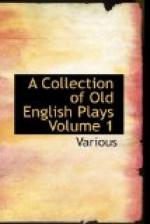But now I will bring my remarks to a close. It has been at once a pride and a pleasure to me to rescue this fine old play from undeserved oblivion. There is but one living poet whose genius could treat worthily the tragical story of Nero’s life and death. In his three noble sonnets, “The Emperor’s Progress,” Mr. Swinburne shows that he has pondered the subject deeply: if ever he should give us a Tragedy of Nero, we may be sure that one more deathless contribution would be added to our dramatic literature.
Addenda and Corrigenda.
After Nero had been printed I found among the Egerton MSS. (No. 1994), in the British Museum, a transcript in a contemporary hand. The precious folio to which it belongs contains fifteen plays: of these some will be printed entire in Vols. II and III, and a full account of the other pieces will be given in an appendix to Vol. II. The transcript of Nero is not by any means so accurate as the printed copy; and sometimes we meet with the most ridiculous mistakes. For instance, on p. 82 for “Beauties sweet Scarres” the MS. gives “Starres”; on p. 19 for “Nisa” ("not Bacchus drawn from Nisa”) we find “Nilus”; and in the line “Nor us, though Romane, Lais will refuse” (p. 81) the MS. pointlessly reads “Ladies will refuse.” On the other hand, many of the readings are a distinct improvement, and I am glad to find some of my own emendations confirmed. But let us start ab initio:—
p. 13, l. 4. 4to. Imperiall tytles; MS. Imperial stuffe.
p. 14, l. 3. 4to. small grace; MS. sale grace.—The allusion in the following line to the notorious “dark lights” makes the MS. reading certain.—Lower down for “and other of thy blindnesses” the MS. gives “another”: neither reading is intelligible.
p. 17, l. 5. MS. rightly gives “cleave the ayre.”
p. 30, l. 2. “Fatu[m’]st in partibus illis || Quas sinus abscondit. Petron.”—added in margin of MS.
p. 31, l. 17. 4to. or bruised in my fall; MS. I bruised in my fall!
p. 32, l. 4. 4to. Shoulder pack’t Peleus; MS. Shoulder peac’d. The MS. confirms my emendation “shoulder-piec’d.”
p. 32, l. 13. 4to. shoutes and noyse; MS. shoutes and triumphs.—From this point to p. 39 (last line but one) the MS. is defective.
p. 40, l. 8. 4to. our visitation; MS. or visitation.
p. 42, l. 11. 4to. others; MS. ours.
p. 46, l. 22. 4to. Wracke out; MS. wreake not.
p. 47, l. 17. 4to. Toth’ the point of Agrippa; MS. tooth’ prince [sic] of Agrippinas.
p. 54, l. 2. 4to. Pleides burnes; Jupiter Saturne burnes; MS. Alcides burnes, Jupiter Stator burnes.
p. 54, l. 23. 4to. thee gets; in MS. gets has been corrected, by a different hand, into Getes.
p. 54, l. 26. 4to. the most condemned; MS. the ------ condemned: a blank is unfortunately left in the MS.
p. 56, l. 20. 4to. writhes; MS. wreathes.




